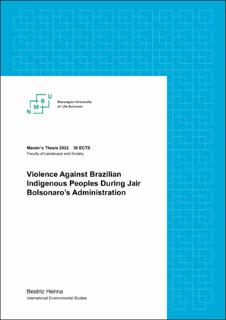| dc.description.abstract | Violence against the Brazilian Indigenous peoples has increased significantly since the end of 2018. It is well-known that minorities face exclusion, marginalization, and violence daily; the situation with the Indigenous peoples in Brazil is not different. Since the arrival of the colonizers, they have been expelled from their original lands, slaved, and mistreated. However, the situation became alarming after the election of the current Brazilian President, Jair Bolsonaro. This thesis aims to analyze the connection between Jair Bolsonaro’s actions and rhetoric, and the violence escalation toward the Indigenous population.
To assess the relationship between a leader’s speeches and the actual acts of violence, I used a violence framework, which categorizes violence into three: direct, cultural, and structural. The latter has a sub-category: institutional. Due to the Covid-19 pandemic, collecting in-situ data was impossible, therefore the data used for this thesis was drawn from secondary sources. The main data was collected through the Violence Against Indigenous Peoples in Brazil reports from a recognized organization called Cimi (Missionary Indigenist Council). Additionally, data from newspapers, social media, and interviews were gathered to deeply determine the association between the President’s rhetoric and substantial acts of violence against the Indigenous peoples.
The results from the analysis show an evident increase in violence (i.e., murders, territory invasions, lack of health care, illegal resource exploitation, racism, among others) toward the Indigenous peoples since the election of President Jair Bolsonaro. I argue that his hate speeches have encouraged people to commit such acts of violence. Furthermore, I claim that through his actions of trying to pass anti-constitutional law proposals, he has violated Indigenous rights, and advocated for others to do the same. | en_US |

